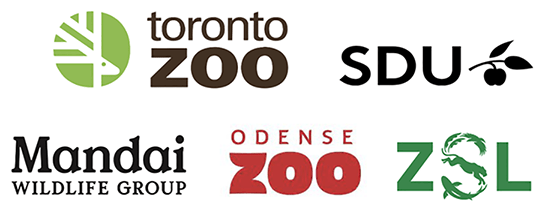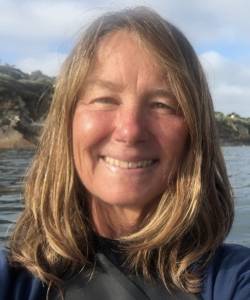
Sandy Trautwein, PhD
Director of Conservation and Science
Sandy joined Species360 as Director of Aquatic Conservation and Product Management in February 2021 and transitioned to Director of Conservation in June 2023. Her extensive leadership experience in aquarium husbandry, conservation, and research provides Sandy with the knowledge and skills needed to lead the Conservation Department.
Sandy began her aquarium career as an Aquarist at the National Aquarium in Baltimore in the 1980s. She helped open the Aquarium of the Pacific in California where she served as Curator and later Vice President of Husbandry. She completed a Bachelor of Science degree in Biology from Towson State University, Maryland, and a Master of Science degree in Marine Biology from the University of Charleston, South Carolina. Her research interest in corals and crustaceans led to a PhD in Biology from the University of California in Los Angeles with a focus on systematics. Her aquarium conservation work includes the development of a major species recovery program for the critically endangered white abalone (Haliotis sorenseni) at the Aquarium of the Pacific. Her passion for conserving species and the natural world aligns perfectly with Species360’s mission and vision.
Collaborative Engagements
- Member of the Aquarium Committee of WAZA (the World Association of Zoos and Aquariums)
Follow her work on:
- Contact: Sandy.Trautwein@species360.org
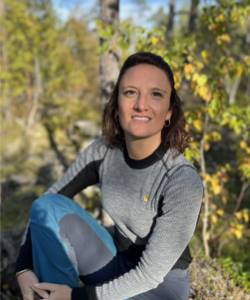
Morgane Tidière, PhD
Science Team Lead
Dr. Morgane Tidière is an assistant professor with a joint position within the Conservation & Science Department at Species360 and within the Population Biology Team, Department of Biology, at the University of Southern Denmark.
Her work focuses on improving our understanding of the interaction between changing environment and evolutionary factors to explain the differences in demographic parameters (survival and reproduction) between sexes, populations, and species, across the tree of life. By analyzing the aggregated data in ZIMS, she tries to find unique insights into species, which we can then translate into analytic tools. Her aim is to support zoos and aquariums in pursuing improved management practices and the overall care and welfare of their animals, as well as improving the global evolution and demographic knowledge of species.
After an international Masters degree in “Ecology and Evolutionary Biology” in France and “Environmental Biology” in Italy, Morgane did her PhD. at the University of Lyon, France, where she studied the diversity of actuarial senescence across mammals using demographic data from Species360 members. Additionally, Morgane did a postdoc at the Centre for Biodiversity Dynamics, Norway, studying the allometric problematic of horn length in bovids. After that, she worked one and a half years at the LabEx ECOFECT, France, where she focused on understanding the influence of the parasite richness on the evolution of mammalian longevity and senescence. In between, she had the opportunity to work as a fieldwork assistant at the Kalahari Research Center, South Africa, to settle a long-term project on Cap ground squirrels. She, finally, joined Species360 and the University of Southern Denmark in 2020.
Collaborative Engagements
- Member of the Welfare Committee for the AFdPZ (the French Association of Zoological Parcs)
Follow her work on:
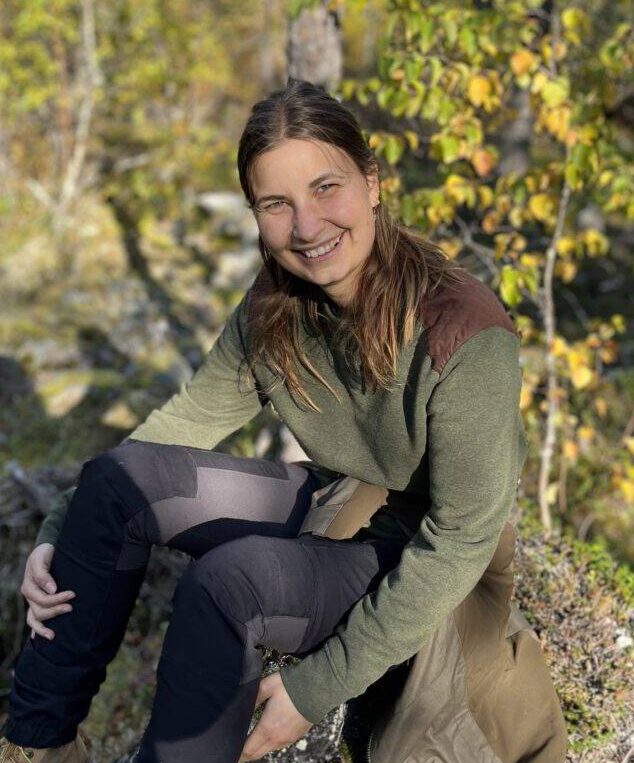
Rikke Øgelund Nielsen, MSc
Assistant Research Scientist
Rikke Øgelund Nielsen splits her time between the Species360 Science Team as part of the Population Biology Team, Department of Biology, at the University of Southern Denmark – and as the Zoological Director, Head of Research and Conservation, and ZIMS registrar at Terrariet – Reptile Zoo in Denmark. She is working in the interface between conservation biology and data science examining how data from the worlds’ zoos and aquariums can support the decision-making process for captive management and global conventions and treaties such as CITES. She did her masters degree analyzing zoos and aquariums through the lens of CITES and their opportunities to support Elasmobranch species threatened by international trade. At the same time she worked for the Danish Management Authorities of CITES for several years before starting this joint position.
Currently she is working on defining age- and sex-specific growth patterns of cartilaginous fishes to improve their population management and wellbeing in aquariums while co-coordinating our research request process.
Collaborative Engagements
- Member of the Welfare Committee for DAZA (the Danish Association of Zoos and Aquariums)
- Co-coordinating the Conservation of Danish Biodiversity working group in DAZA
Follow her work on:
- Research Gate: Rikke Øgelund Nielsen
- Contact: Rikke.Ogelund@species360.org
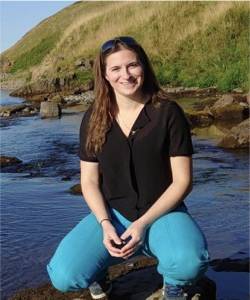
Floriane Plard, PhD
Analyst Consultant
Floriane Plard is a researcher in population ecology & evolutionary ecology, specialized in modeling and statistics. After different professional experience on analyzing the population ecology of endangered, common or hunting bird and mammal species, she is now a consultant in quantitative ecology. She develops models and software to quantify individual and environmental factors influencing temporal and spatial dynamics of populations and predict the impact of climate and human change on biodiversity. She is supporting scientists, students, biodiversity managers, associations, and local authorities to solve their challenge and take informed decisions by relying on robust results. Floriane joined the Science Team of Species360 to complete the analytics developed to study species demography per sex and to report key survival, reproductive, and growth values per species and institution.
Follow her work on:
Species360 Conservation & Science Department Students
Graduating in January 2026
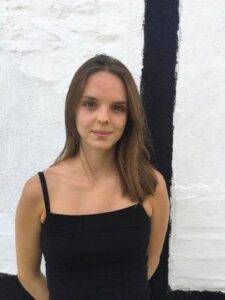
Matilde Sivkær Pettersen
Master Project
Project title: Reproductive parameters in cartilaginous fishes (sharks and rays).
Summary of project: This master’s project studies breeding success in cartilaginous fish (sharks and rays) kept in public aquariums and aims to identify life history traits associated with successful reproduction, such as age and size at reproduction. Using anonymised global data from the Zoological Information Management System (ZIMS), this study compares reproductive parameters in aquarium and wild populations to investigate factors influencing reproductive outcomes. The findings will help improve both in situ and ex situ conservation strategies, supporting the One Plan Approach to species conservation.
About me: I chose this project because I have always been passionate about species conservation, especially for aquatic animals, which also led me to study biology in the first place. Joining the CSA has given me a chance to contribute to this field and gain some valuable experience working with real-world data and conservation tools, especially by analyzing data in R. I am still exploring my future path, but if I can make even a small difference, or contribute in the slightest to wildlife and species conservation, I will be more than content.

Natasha Marie Hansen
Master thesis (Master cursus)
Project title:Estimating and modelling age patterns in mortality of zoo animals.
Summary of project: This project investigates age patterns of mortality in zoo animals using data from the Species360 Zoological Information Management System (ZIMS). The aim is to estimate and model age patterns in mortality and define age thresholds between four different age-stages: juvenile, adult, old, and “centenarians”. By applying demographic measures and analytical approaches, including clustering as an exploratory tool, the study seeks to establish a framework where life stages can be described in a data-driven and biologically meaningful way.
About me: I am a marine biologist with a strong interest in data, currently pursuing a second Master’s degree in Environmental Data Science. Over the past four years, I have worked as a teaching assistant in zoology, which has strengthened my interest in animal biology and life history concepts. My academic focus is on applying quantitative and statistical approaches to biological data. Collaborating with Species360 through access to the ZIMS database allows me to combine my biological background with data-driven analysis to support animal welfare and conservation goals.
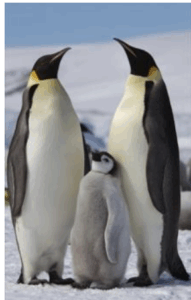
Hannah Soele Christensen
Independent Research Project (Master cursus)
Project title: Colony size and reproductive success in ex situ populations of penguins.
Summary of project: In this project I will be using anonymised global data from the Zoological Information Management System (ZIMS) for penguins to determine a possible correlation between colony size and reproductive success. It will be done through analysing data regarding the size of the penguin colony, the species, and reproduction. The research is not limited to one species of penguin but will be looking at the whole Spheniscidae family.
About me: I’m a master’s student, who values the world and more specifically the nature that exists around us. It’s important to me that we take care of the world we live in and all the species that inhabit it alongside us. Therefore, projects like this are of greater interest to me, as it allows me to hopefully push our knowledge and actions in the direction of better preserving what we currently have before it’s too late to fix it.
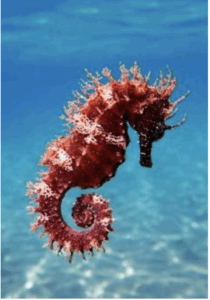
Julie Gjerning Clausen
Independent Research Project (Master cursus)
Project title: Lifespan of Syngnathidae in relation to parental care and sexual selection pressure.
Summary of project: This project will investigate the longevity differences between male and female populations of species of seahorses and pipefish (family Syngnathidae), by analysing the lifespan of captive species. To do so, I will use the anonymised global data from the Zoological Information Management System (ZIMS)
About me: I am a master’s student who enjoys using real life data to find out knowledge. This project allows me to work with data of interesting and unique species, which are dear to me. Having this opportunity means that I can contribute to the vast amount of knowledge in the world, which is why I pursued academia in the first place.

Laura Vergo
Individual Study Activity (Bachelor cursus)
Project title: Variability in the longevity of hazel dormice (Muscardinus avellanarius).
Summary of project: This project aims to investigate whether the longevity of hazel dormice differs between sexes and different environmental factors. Recent studies show that the males of the hazel dormouse have a higher life expectancy than the females, which is not typical for most mammals. Furthermore, the hazel dormouse can choose whether to hibernate or not based on the environment in which it lives, and research shows that hibernating animals are expected to live longer than non-hibernating ones. Using anonymised global data from ZIMS on hazel dormice, this project therefore aims to investigate if there is a sex-difference in the longevity of ex situ populations of hazel dormice, and if there’s a correlation between longevity and the environment in which the ex situ populations live.
About me: I have always been passionate about species conservation, and it’s something I have always wanted to work with. However, since I started working as a guide in the local zoo, my eyes have also been opened to the great possibilities ex situ data provides for research about both wild and zoo populations. I am especially interested in how research on zoo animals can be used for conservation of their wild counterparts. That’s why I’ve chosen to work on this project, because it lays out a small stepping-stone for further research in this topic.
Graduated in June 2025
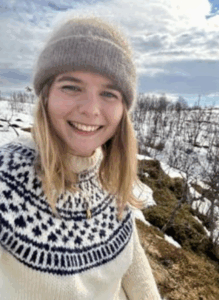
Caroline Lundholm Kross
Master Project
Project title: Study of factors influencing the litter size of the five Panthera species.
Summary of project: In my study, I examine how various factors, including species, maternal age, and birth period, affect litter size in the five Panthera species using anonymised ZIMS data. Results obtained in zoological institutions were then compared to those from the wild.
About me: I chose this project because I wanted to explore the role of zoological institutions in creating optimal conservation management plans, both ex situ and in situ. I particularly enjoyed working with the dataset, developing new statistical skills, and discovering how, for some species, such as the elusive snow leopard, zoological data can be essential for understanding key demographic parameters. In the future, I plan to work within this field, bridging conservation efforts between zoological institutions and wild populations.
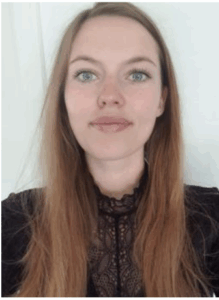
Nanna Aarenstrup
Company project with Odense Zoo (Master cursus)
Project title: Developing a species-specific ethogram on West Indian manatees (Trichechus manatus)
Aim of the project: To develop and validate a species-specific ethogram for West Indian manatees (Trichechus manatus) through observation of individuals in managed care and review of existing literature. The ethogram will be tested for intra- and inter-observer reliability to ensure consistency and applicability, ultimately supporting species-specific welfare assessments and contributing to manatee conservation in zoological settings.
About me: I joined the CSA for my project to connect with a community engaged in improving animal welfare and to contribute to species-specific welfare tools for animals under managed care. The project deepened my understanding of behavioural research and its applications in ex situ settings, which I found very rewarding. In the future, I hope to work in wildlife conservation or zoo animal welfare, combining research with practical solutions to support endangered species.
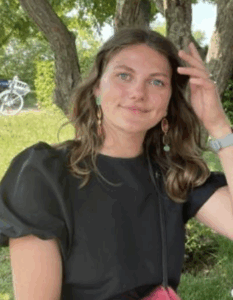
Klara Øxenberg
Bachelor Project
Project title: The effects of chaperone activity on IDPs phase separation.
Aim of the project: To explore protein interactions in the brain related to neurodegenerative diseases. More specifically, I will clarify whether the chaperone DNAJB6 influences the phase behaviour of TDP-43 in humans and explore how this interaction might influence protein aggregation. The findings may provide insights into the role of chaperones in neurodegenerative diseases.
About me: With a bachelor’s degree in veterinary medicine from the University of Copenhagen, I am currently pursuing a degree in Biology at the University of Southern Denmark. This work has significantly deepened my understanding of scientific processes and enriched my knowledge base. In the future, I aim to combine my research in neuroscience and biology with science communication, striving to make complex scientific concepts more accessible for a wider audience.
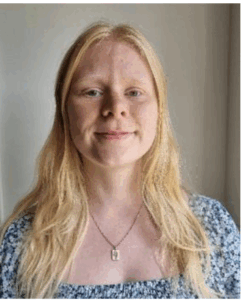
Freja Rydborg Gregersen
Bachelor Project
Project title: The reproductive success of tigers (Panthera tigris).
Aim of the project: Studies suggest that tigers, and other mammals, might see their fertility reduced if they start to reproduce at an advanced age. By studying the relationship between age at first reproduction and lifetime reproductive output, I aim to test this hypothesis in tigers living in zoological facilities. Using anonymised global data from ZIMS on tigeris, I aim to define an optimal age limit for first reproduction, that will be crucial to ensure the sustainability of tiger populations.
About me: Through the CSA, I had the opportunity to work on a project related to a topic I have a special interest in. I learned how to use the programming tool RStudio to analyse large amounts of data and write a scientific paper, even with dyscalculia. In the future, I would like to continue working with the conservation of tigers and other big cats.
Graduated in January 2025

Matilde Sivkær Pettersen
Independent Research Project (Master cursus)
Project title: Public perceptions and welfare perspectives on cetaceans in zoological facilities.
Summary of project: This project explored the polarised public opinions on the use of cetaceans in zoological facilities by analysing survey responses and interviews with both supporters and critics. The findings showed that proponents emphasised the importance of research, education, and conservation, while opponents focused more on ethical concerns and individual animal welfare. The study emphasised the need for trust, transparency, and open dialogue between the parties to advance and ensure ethical and sustainable conservation practices.
About me: I chose this project because I have always been passionate about species conservation, especially for aquatic animals, which also led me to study biology in the first place. Joining the CSA has given me a chance to contribute to this field and gain some valuable experience working with real-world data and conservation tools, especially using a mixed-method approach. I am still exploring my future path, but if I can make even a small difference, or contribute in the slightest to wildlife and species conservation, I will be more than content.

Nanna Aarenstrup
Independent Research Project (Master cursus)
Project title: Evaluating the reliability of an ethogram developed on Komodo dragons (Varanus komodoensis).
Summary of project: In this project, I tested the intra- and inter-observer reliability of a species-specific ethogram developed for Komodo dragons (Varanus komodoensis) during my bachelor’s thesis. The project also refined and expanded the ethogram, supporting its future application in behavioural studies and welfare assessments of Komodo dragons under managed care.
About me: I joined the CSA for my projects to connect with a community engaged in improving animal welfare and to contribute to species-specific welfare tools for animals under managed care. The project deepened my understanding of behavioural research and its applications in ex-situ settings, which I found very rewarding. In the future, I hope to work in wildlife conservation or zoo animal welfare, combining research with practical solutions to support endangered species.
